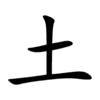土
| ||||||||
| ||||||||
Translingual
| Stroke order | |||
|---|---|---|---|
| Stroke order | |||
|---|---|---|---|
 | |||
Han character
土 (Kangxi radical 32, 土+0, 3 strokes, cangjie input 土 (G), four-corner 40100, composition ⿱十一)
- Kangxi radical #32, ⼟.
Derived characters
- Appendix:Chinese radical/土
- 𫡢, 吐, 𡚳, 𢎳, 𢓂, 𪫞, 扗, 汢, 肚, 杜, 𣧅, 灶, 牡, 𤣰, 社, 𨑒, 𥃾, 𥝟, 𬡃, 𫊥, 䝅, 𧺔, 𮛄, 𨑡, 𪶇, 釷(钍), 靯, 𩡶, 𩵚(𬶂), 𪐢, 𡉗, 𨙭, 𤬪, 壻, 䲧, 䵺
- 凷, 𫧀, 𫲵, 尘, 圧, 庄, 𢨫, 芏, 𬻁, 至, 𣂓, 𭎊, 𦉷, 𥤧, 𭯼, 㽵, 茔, 里, 𥫦, 𮓛, 𦯀, 䦌(𮤬), 𫕞, 𭎭, 𣵹, 𤥷, 𡴠, 𩫽, 烾, 𤍢, 𪔋, 墨, 皨, 䜃, 㦱, 𧗥, 㐋, 去, 𠮷, 𡕟, 寺, 𢖽, 𭟯, 𣏅, 灻, 𣏄, 赤, 走, 赱, 幸, 𥸮, 𫅢, 𮤇, 𪔄, 𪔌
References
- KangXi: page 223, character 1
- Dai Kanwa Jiten: character 4867
- Dae Jaweon: page 453, character 23
- Hanyu Da Zidian (first edition): volume 1, page 415, character 1
- Unihan data for U+571F
Chinese
| simp. and trad. |
土 | |
|---|---|---|
| alternative forms | 士 圡 𡈽 | |
Glyph origin
| Historical forms of the character 土 | ||||||
|---|---|---|---|---|---|---|
| Shang | Western Zhou | Spring and Autumn | Warring States | Shuowen Jiezi (compiled in Han) | Liushutong (compiled in Ming) | |
| Oracle bone script | Bronze inscriptions | Bronze inscriptions | Chu slip and silk script | Qin slip script | Small seal script | Transcribed ancient scripts |
 |
 |
 |
 |
 |
 |
 |
Pictogram (象形) : a lump of clay on a potter’s wheel.
Etymology 1
There is no obvious cognate and etymology, unless it may be related to Proto-Austroasiatic *tiʔ (Proto-Monic *tiiʔ (“soil; ground consisting of earth”), Semnam tɛʔ (“soil; earth”)). However, this would require the assumption of a shift from front vowel to Old Chinese *a (Schuessler, 2007).
Probably related to 社 (OC *ɦljaːʔ, “god of soil; altar to god of soil”).
Pronunciation
Definitions
土
- earth; soil
- (dialectal) dust
- land
- 溥天之下,莫非王土。 [Pre-Classical Chinese, trad. and simp.]
- From: The Classic of Poetry, c. 11th – 7th centuries BCE, translated based on James Legge's version
- Pǔtiān zhī xià, mòfēi wángtǔ. [Pinyin]
- Under the wide heaven,
All is the king's land.
- crude opium
- hometown; native place
- 故土 ― gùtǔ ― native land; native place
- local; native; indigenous
- rustic; unsophisticated; uncouth; vulgar; tasteless; uncultured
- indigenous; traditional and used by the common people
- (~族) the Tu ethnic group; Monguor people; White Mongol
- Short for 土耳其 (Tǔ'ěrqí, “Turkey”).
- a surname
Synonyms
- (earth):
- (dust):
- (land): 土地 (tǔdì)
- (hometown):
Antonyms
- (indigenous): 洋 (yáng)
Compounds
|
|
|
Pronunciation
Definitions
土
- † Alternative form of 杜 (dù, “root”).
- 迨天之未陰雨、徹彼桑土、綢繆牖戶。 [Pre-Classical Chinese, trad.]
- From: The Classic of Poetry, c. 11th – 7th centuries BCE, translated based on James Legge's version
- Dài tiān zhī wèi yīnyǔ, chè bǐ sāngdù, chóumóu yǒuhù. [Pinyin]
- Before the sky was dark with rain,
I gathered the roots of the mulberry tree,
And bound round and round my window and door.
迨天之未阴雨、彻彼桑土、绸缪牖户。 [Pre-Classical Chinese, simp.]
- † An ancient river
Pronunciation
Pronunciation
Etymology 5
| For pronunciation and definitions of 土 – see 士 (“unmarried male; bachelor; man; etc.”). (This character, 土, is a variant form of 士.) |
References
- “土”, in 漢語多功能字庫 (Multi-function Chinese Character Database), 香港中文大學 (the Chinese University of Hong Kong), 2014–
- Dictionary of Chinese Character Variants (教育部異體字字典), A00740
- Dictionary of Chinese Character Variants (教育部異體字字典), A00831-001
- “Entry #192”, in 臺灣閩南語常用詞辭典 [Dictionary of Frequently-Used Taiwan Minnan] (in Chinese and Min Nan), Ministry of Education, R.O.C., 2011.
Japanese
Readings
Etymology 1
| Kanji in this term |
|---|
| 土 |
| つち Grade: 1 |
| kun’yomi |
| Alternative spelling |
|---|
| 地 |
From Old Japanese.[1][2]
Idioms
- 土を踏む (tsuchi o fumu, “tread on the ground → enter a foreign country”)
Etymology 3
| Kanji in this term |
|---|
| 土 |
| ど Grade: 1 |
| kan’yōon |
(This etymology is missing or incomplete. Please add to it, or discuss it at the Etymology scriptorium.)
Pronunciation
- IPA(key): [do̞]
Korean
Etymology
From Middle Chinese 土 (MC tʰuoX).
| Historical Readings | ||
|---|---|---|
| Dongguk Jeongun Reading | ||
| Dongguk Jeongun, 1448 | 통〯 (Yale: thwǒ) | |
| Middle Korean | ||
| Text | Eumhun | |
| Gloss (hun) | Reading | |
| Hunmong Jahoe, 1527 | ᄒᆞᆰ (Yale: hòlk) | 토〮 (Yale: thwó) |
Pronunciation
- (SK Standard/Seoul) IPA(key): [tʰo̞]
- Phonetic hangul: [토]
Compounds
- 국토 (國土, gukto, “national territory”)
- 본토 (本土, bonto)
- 영토 (領土, yeongto, “territory”)
- 척토 (瘠土, cheokto, “barren soil”)
- 토기 (土器, togi, “earthenware”)
- 토대 (土臺, todae)
- 토성 (土星, ^toseong, “Saturn”)
- 토양 (土壤, toyang)
- 토요일 (土曜日, ^toyoil)
- 토종 (土種, tojong, “native species”)
- 토지 (土地, toji)
- 풍토 (風土, pungto)
- 향토 (鄕土, hyangto, “local; rural”)
- 황토 (黃土, hwangto)
Vietnamese
Han character
土: Hán Việt readings: thổ (
土: Nôm readings: thổ[1][2][4], độ[2], thuở[2]
References
- Nguyễn (2014).
- Nguyễn et al. (2009).
- Trần (2004).
- Taberd & Pigneau de Béhaine (1838).